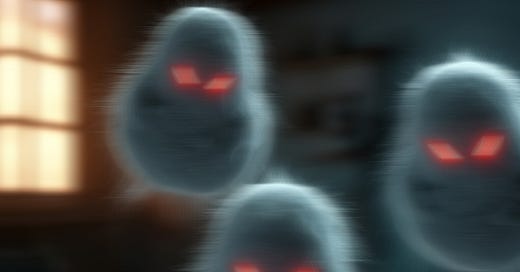Scene: A slightly fusty, over-furnished Victorian terraced house in a quiet London suburb. Mid-20th Century.
Arthur Grumbles was a man of meticulous habits and deeply ingrained routines. His life, like his collection of antique thimbles, was precisely ordered. So, when small, insignificant items began to vanish, it was more than an annoyance; it was an affront to his very being. First, it was the little silver spoon he used exclusively for his morning grapefruit. Then, a specific collar stud. Then, the spare key to the back door.
"Losing my marbles, that's what it is" Arthur muttered to his cat, Pilkington (who, truth be told, seemed entirely unconcerned). He redoubled his efforts at tidiness, labelling drawers and checking his pockets thrice before leaving any room. Yet, the pilfering continued.
The Hoarding Horde
Soon, Arthur began to catch fleeting glimpses out of the corner of his eye: a grey, wispy blur skittering along the skirting board, a shadowy tremor beneath the Chesterfield. When he’d turn his head sharply, there would be nothing but an unusually large, placid-looking dust bunny, perhaps with a faint shimmer around its edges if the light caught it just so. He swore, once or twice, he saw tiny, ruby-red pinpricks glowing within the fluff, but dismissed it as fatigue. "Dust in the eye" he’d huff.
The missing items escalated in significance, each disappearance a fresh jab at his sanity. His spectacles (found, days later, inexplicably nestled inside a Wellington boot in the hallway). His prized first edition of "Great Expectations" (vanished entirely). The crucial winding key for the grandfather clock, rendering it silent and accusatory. His favourite biscuit tin – empty, though he was sure it had been half full.
The dark humour of his predicament was lost on Arthur, but not, perhaps, on the universe. He developed a nervous twitch. He started talking to his possessions, pleading with them to stay put. "Now, you behave yourself, letter opener" he’d warn, locking it in his desk drawer, only to find the drawer mysteriously ajar and the opener gone the next morning. He even accused Pilkington, who responded with a disdainful flick of his tail and then, pointedly, coughed up a hairball that Arthur eyed with deep suspicion before realising it lacked the requisite malevolent red glow.
The Unveiling and the Unravelling
The breaking point came with the disappearance of his late wife Mildred’s favourite porcelain teacup, a delicate, irreplaceable thing. Arthur, fueled by a potent cocktail of grief, rage, and sheer, unadulterated frustration, embarked on a frantic, systematic search of the house. He emptied cupboards, overturned furniture, tore up loose floorboards he hadn't known were loose.
The trail of minor domestic detritus – a dropped button here, a stray coin there, all subtly leading him – eventually brought him to the attic, a space he hadn’t entered in years. The air was thick, tasting of ancient lint and something else, something dry and faintly acrid.
And there it was.
In the dim light filtering through a single grimy window, it dominated the far corner: The Nest. A colossal, vaguely ovoid structure, easily six feet high, constructed entirely from compacted dust, cobwebs, human and cat hair, shredded paper, and fabric fibres. And woven into its pulsating, almost breathing surface, like macabre jewels, were all his missing things: the grapefruit spoon, the collar stud, the winding key, even the tarnished cover of "Great Expectations". And there, nestled near the top like a grotesque offering, was Mildred’s teacup.
From the shadowy depths of the Nest, and from the darker corners of the attic, countless pairs of tiny, ruby-red eyes glowed, fixing him with an intelligent, collective, and deeply unsettling stare. The faint skittering sounds he’d occasionally heard downstairs were now a clear, rustling chorus. The Dust Bunnies, no longer wispy individual blurs, but a coordinated, silent army, had revealed their hoard, their purpose.
The Servant of the Fluff
Arthur Grumbles did not scream. He did not faint. He simply stood there, his righteous fury deflating like a pricked balloon, replaced by a vast, hollow weariness. He had been outmanoeuvred, out-hoarded, by sentient fluff. The absurdity was too immense, the implications too exhausting. What was the point of fighting? They had already taken everything that mattered, or could make it vanish if they chose.
He turned, slowly, and descended the attic stairs, leaving the Nest and its myriad glowing eyes to their silent, dusty dominion.
The final scene: Weeks later. Arthur Grumbles, thinner, his eyes holding a permanent, haunted resignation, shuffles into his chilly kitchen. The house is noticeably dustier, the corners thick with undisturbed fluff. He opens his last packet of digestive biscuits. He takes one for himself, then carefully breaks another in half. He walks over to the largest, most quiescent dust bunny he can see lurking under the Welsh dresser – a particularly plump specimen from whose depths two ruby pinpricks gleam with knowing intensity. Arthur sighs, a sound like dry leaves skittering across pavement, and places the biscuit half carefully before it.
"There you are, then" he murmurs, his voice raspy. "Don't say I never give you anything.".
The dust bunny remains still for a moment. Then, a tiny, almost imperceptible tremor runs through it, and the biscuit half is slowly, silently, drawn into its grey, wispy mass. Arthur watches, then shuffles away to eat his own meagre portion in the growing gloom.






Never look under the bed or in the attic! A little borrowing from The Borrowers, by Mary Norton?